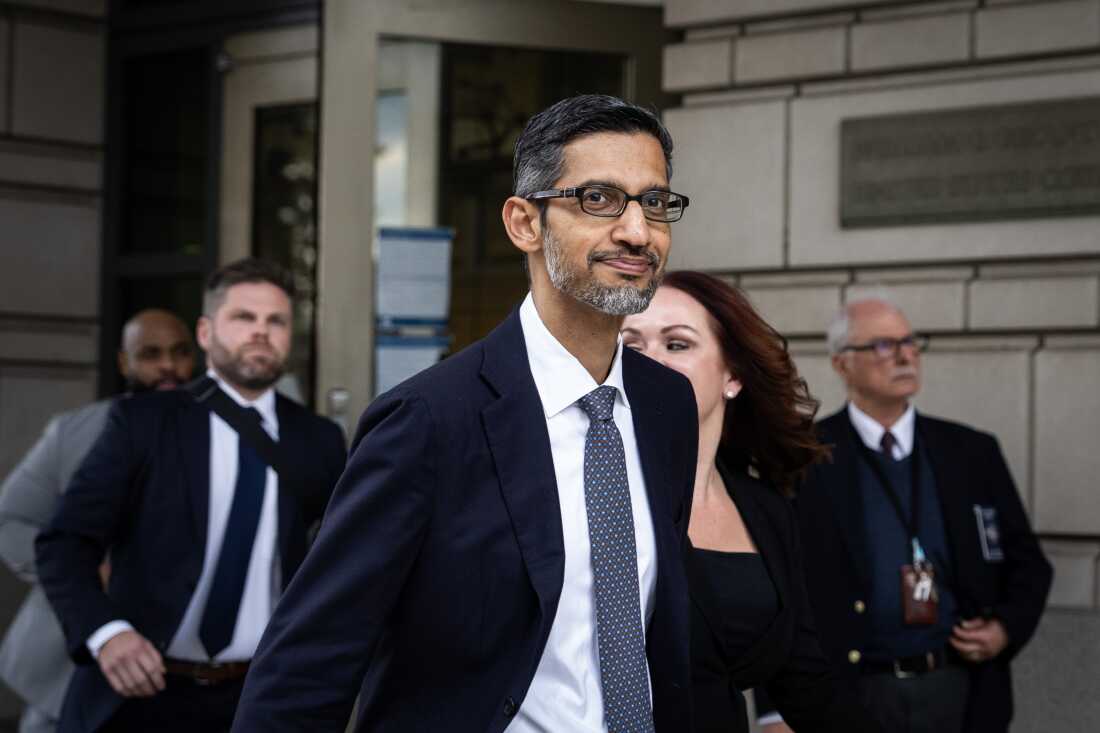
A woman walks past a Google logo at the Google Campus in Warsaw on Feb.13, 2025. SERGEI GAPON/AFP via Getty Images hide caption
toggle caption
SERGEI GAPON/AFP via Getty Images
Nine months ago, a federal judge ruled that Google has an illegal monopoly in the search engine market. Today, the tech giant is back in court for closing arguments in the final phase of this trial. The judge will be left to decide how the company should be punished, concluding the biggest tech antitrust case in 25 years.
During what's called the "remedies" phase of the trial, which began April 21, lawyers for Google and the Justice Department presented very different options for how they hope U.S. District Judge Amit Mehta will rule that the roughly $2-trillion-dollar company should atone for its monopoly. And the two sides remain far apart.
Closing arguments, which are expected to last all day Friday at the E. Barrett Prettyman United States Courthouse in Washington, D.C., give the two sides a final chance to argue their ideas to Mehta. The DOJ has urged the court to slap Google with aggressive remedies including forcing the sale of its incredibly popular Chrome browser and making the company license some of its core search technology.
The tech company has strongly objected to these remedies. Google maintains the DOJ's proposals are out of line with legal precedent and have suggested much lighter alternatives, saying that they will stop making exclusive agreements with device makers to ensure Google is their default search engine, and that they will establish an oversight committee to check the company's actions.
Here's what to know about the trial so far.

Google and Alphabet CEO Sundar Pichai departs federal court on Oct. 30, 2023, in Washington, D.C. Pichai testified on to defend his company during the original trial phase of the search engine antitrust case. Drew Angerer/Getty Images North America hide caption
toggle caption
Drew Angerer/Getty Images North America
What is this case about?
The DOJ filed its case against Google in 2020, focusing on the company's contracts with device makers like Apple and Samsung that require Google to be the default search engine on new phones. The agency argued this unfairly boxed out competitors.
Now, the DOJ wants Google to be barred from making these exclusive deals.
"Unless Google's vast payments are eliminated, Google will likely win each search distribution opportunity, given the tremendous advantages it has accrued from over 10 years of monopoly maintenance," lawyers for the DOJ wrote in court filings ahead of closing arguments.
And while the company has agreed to roll back those agreements, the DOJ's proposals go much further. The DOJ is also asking the judge to order Google to sell off its Chrome browser and the open source Chromium project. The government argues that Google's control of Chrome, the world's most popular browser, drives traffic to its search engine and revenue to the company — which the DOJ calls an unfair advantage. The sale of Chrome, the DOJ argues, will even the playing field for competitors.

A cursor moves over Google's search engine page, in Portland, Ore., in 2018. Don Ryan/AP hide caption
toggle caption
Don Ryan/AP
And although the government's case originally focused on search, it now encompasses artificial intelligence. Lawyers for the DOJ want to prevent Google from establishing similar exclusive distribution agreements for its AI programs and apps, such as its Gemini chatbot.
The DOJ says Google could use its artificial intelligence products to strengthen its monopoly in online search — and to use the data from its powerful search index to become the dominant player in AI. Google's search index is essentially an enormous database of information from billions of webpages.
In particular, the DOJ is focusing on the future of generative AI, or GenAI, which can be used to create text or images based on a user's prompts.
"We are at an inflection point," the DOJ wrote in court documents. "Now GenAI offers the possibility of the next digital frontier, if given the opportunity and time to emerge. It is thus critical to extend remedies to GenAI to allow this new technology to rise or fall outside the shadow of Google's search monopoly."
The DOJ argues that making Google share its index as well as search data — like users' search queries, clicks and results — with AI developers who want to license it will create fair competition.
The DOJ called Nick Turley, OpenAI's head of product for ChatGPT, to testify in April. He said that his company would love to have access to Google's search index and data to strengthen their popular large language model.
Turley also testified that OpenAI had previously tried to make a deal with Google to gain access to their search data, but Google declined, seeing them as a direct competitor.
What is Google expected to argue?
Google has argued that these remedies are too severe, calling them "unprecedented" and saying they would hurt consumers, the economy and tech innovation.
In April, Google CEO Sundar Pichai testified that forcing the company to share its search data would be a "de facto divestiture" of its search engine, representing decades of investment and work.
Google's lawyers have repeatedly argued that the company does not monopolize the AI market, because there are a host of AI companies with chatbots — some of which are outperforming Gemini.

The OpenAI logo is seen on a mobile phone in front of a computer screen which displays output from ChatGPT, March 21, 2023, in Boston. Michael Dwyer/AP hide caption
toggle caption
Michael Dwyer/AP
And they have emphasized the cybersecurity and data security risks posed by spinning off Chrome and sharing search information.
Spinning off Chrome would break it, rendering it "insecure and obsolete" and a "shadow of the current Chrome," Parisa Tabriz, vice president of engineering and general manager for Chrome, said in court.
And Google has long argued that it can't vouch for the security of search data once it's shared with other companies.
"DOJ's proposal would force Google to share your most sensitive and private search queries with companies you may never have heard of, jeopardizing your privacy and security," Lee-Anne Mulholland, the company's vice president of regulatory affairs, wrote in an April blog post. "Your private information would be exposed, without your permission, to companies that lack Google's world-class security protections, where it could be exploited by bad actors."
What comes after closing arguments?
Several months of waiting.
Mehta has indicated he expects to issue a decision in August.
After a decision comes down, Google is expected to file a request for a stay of the remedies. If granted, the company won't have to immediately follow through with any of the penalties Mehta decides to levy.

Google CEO Sundar Pichai addresses the crowd during Google's annual I/O developers conference in Mountain View, Calif., on May 20. AI has become a major piece of the government's concerns in Google's search engine monopoly case. CAMILLE COHEN/AFP via Getty Images hide caption
toggle caption
CAMILLE COHEN/AFP via Getty Images
After that, Google officials have said they will file an appeal of Mehta's 2024 finding that the company violated antitrust laws.
But that doesn't mean the tech giant is safe from further government scrutiny.
Last week, Bloomberg reported that the Justice Department is investigating whether Google broke antitrust law in a deal with chatbot maker Character.AI. And in April, a federal judge found that Google acted illegally to maintain a monopoly in online advertising technology.

 3 months ago
108
3 months ago
108





















































